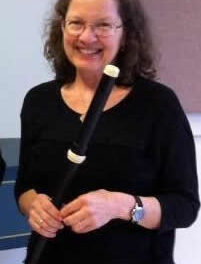Clara Yang‘s enterprising piano recital in the lovely auditorium at Carol Woods Retirement Community Carol Woods Retirement Community brought out a packed house of music lovers suffering from being housebound during the recent slow progression of Hurricane Florence. Yang is currently an associate professor of music and head of keyboard studies at the University of North Carolina-Chapel Hill. She has an impressive resume of national and international performances along with commissions and significant recordings.
There were audible sighs of disappointment when Yang announced she was dropping the scheduled “Feux d’artifices” (Book II, No. 12 from Preludes) by Claude Debussy. Based on Yang’s prismatic color palette, this was unfortunate. She announced “bells” might be a running theme in her selections, especially in the works of three contemporary Chinese composers she featured. In Chinese culture, bells can be a metaphor for nostalgia.
“Pianobells” (2013) by Zhou Long (b.1953) opened the recital. Long’s musical education was interrupted by Chairman Mao’s Cultural Revolution during which the composer was forced to drive a tractor on one of the disastrous collective farms. The composer seeks to capture Chinese timbres and folk themes and synthesize them with Western conceptions of harmony, chromaticism, and angularity. “Pianobells” was inspired by the legend of sonorous bells that ring without being struck.
Yang conjured the sound world of this wonderfully evocative piece superbly. Hints of folk tunes were interwoven with stretches of Impressionist harmonies. The sounds of distant bells heard upon the wind were successfully evoked.
The next work, “Northern Scenes” (2015) by Chen Yi (b.1953), could not have been more different. Yi, besides being a violinist and prize-winning composer, is the wife of Long. She seeks to forge connections between Chinese and Western approaches to music. She was a finalist for the 2006 Pulitzer Prize for Music for her Si Ji (Four Seasons). Originally for solo piano, the composer orchestrated it as a piano concerto and it was premiered in Beijing China and Chapel Hill by Yang and the China Philharmonic Orchestra conducted by Huang Yi ( and reviewed here two years ago with a different conductor).
Yang played the original second movement, Northern Scenes (“The Black Xuanwu in the North”). (A xuanwu is a mythic animal combining turtle and snake characteristics.) I thought of Roger Hannay and John Cage as Yang stood and strummed, slapped, or stroked the piano strings. She brought out all the brazen dynamic contrasts in Yi’s work from thundering fff chords to ghostly whispering of layered textures.
The next sequence of works sampled and surveyed the mystical works of Russian composer Alexander Scriabin (1871-1915). The composer was blessed (or cursed) with a form of synesthesia in which sounds triggered color immages. Yang chose to play three short works without interruption as suite. These were Prelude in C-sharp minor, Op. 11, No. 10 (1888-96), Etude in C-sharp Minor, Op. 42, No. 5 (1903), and Prelude in B, Op. 16, No. 1 (1895). There followed Sonata No. 4 in F-sharp Major, Op. 30 (1903), in two movements. The early works exhibit the influence of Chopin’s style along with unexpected intervals and harmonies. The fourth sonata comes from an important stylist transition. Scriabin’s early aesthetic concerns focused on svet (light) and vziyet (flight). This sonata has a new marking, volando (flying). An accompanying poem evokes “a faint-blue shimmering star approaching from a distance” (from Fabian Bowers’ program note for Nonesuch 73035-2).
Yang’s performance was breathtaking and entrancing in equal measure. What a kaleidoscope of tonal refinement and graduated range of dynamics! She perfectly captured Scriabin’s mood of mystical reverie.
The beauty of Yang’s first post-intermission section suppressed any thoughts of nepotism in her choosing a work that her uncle composed for her. “Reflections on a Tang Poem” (2015) by Phil Young (Yang Zhihua, b.1952) was inspired by a classic Chinese poem “Night Mooring by Maple Bridge” written by renowned Tang Dynasty poet Zhang Ji. It evokes a nostalgic memory of quiet waters under a bridge in the moonlight and mixes Chinese folk themes using a pentatonic scale with suggestions of such traditional instruments as a pipa.
Yang’s performance was scintillating as she brought out all the pointillistic effects in this shimmering tapestry in sound. (A recorded performance by this artist may be enjoyed on her fine recording “Folding Time” on Albany Records, Troy1572).
The concert ended with a bravura performance of Sonata No. 7 in B-flat, Op. 83 (“Stalingrad”) (1942), by Sergei Prokofiev. It is the most concise of his three “war” sonatas. It is in three movements: Allegro inquieto, Andante caloroso, and Precipitato. Yang revealed all of the composer’s evocations of war in the percussive ostinato of the first movement and the odd melancholy mood of the second. Her hands were whirling dervishes over the course of the famous toccata in the last movement! Never have I seen more crossed or interlaced hands as she kept up its headlong motoric rhythm!











